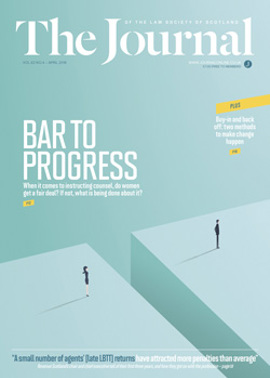Needs of the user

The need to reform Scotland’s legal aid system has been recognised for some time. The system has become increasingly bureaucratic and complex. The Legal Aid (Scotland) Act 1986 predates the Scottish Parliament and its human rights settlement. In 2015, when we called for an independent review of legal aid in our strategy paper, Legal Assistance: Fit for the 21st Century, we recognised the aging system’s challenges.
The review affects all Scottish lawyers. Publicly funded legal assistance is more than just legal aid. The recommendations extend to public legal education, pro bono, and the role of the profession.
A key theme of the report is placing the user at the centre of the legal aid system. This would involve establishing a consumer panel and creating a statutory framework for embedding the user’s voice and experience in the system’s design and delivery. Wider participation by advice sector organisations, local authorities and legal practitioners at national and local justice board level is recommended to improve coordination and participation across the justice system.
Crucially, the report recommends the retention of the current scope of legal aid. That scope is more comprehensive than in England & Wales. Increasing the availability of legal aid into the wider tribunal system is not endorsed, though regular reviews of coverage are recommended to ensure compliance with human rights and UN Sustainable Development Goal 16.3, to “promote the rule of law at the national and international levels, and ensure equal access to justice for all”. Other improvements include simplification around eligibility, contributions and clawback, developing a codified merits test and providing legal aid for group actions.
Practitioner impact
The report’s impact on legal aid practitioners could also be wide-ranging. A sustainably funded legal aid system is crucial to access to justice. Though we are disappointed that no justification could be found by the review for a general increase in fees, legal aid expenditure has been declining since 2010-11, caused in part by declining case numbers and fees remaining static or being cut, as the Scottish Legal Aid Board’s information to the review indicated. One of the functions of the legal aid system is to reimburse practitioners, experts and others for work undertaken to provide access to justice, but no mechanism for periodic review of remuneration exists. The economic downturn over the last decade has seen significant pressure on public expenditure and many public sector salaries have been frozen over this period. Equally, the costs of running a business have continued to increase.
If not now for a general increase in fees, the question must be, when? The report responds by recommending that “a robust and independent evidence-based process for reviewing and agreeing legal aid fees should be established”. The structure, timetable and process for this review are to be established before the end of 2018, with criminal legal aid fees identified as a priority, including fees for early guilty pleas. Other changes are proposed around cashflow, including quarterly payments in advance for qualifying firms and the direct payment of experts by SLAB.
No immediate changes to the delivery model are recommended. The report does advocate that SLAB review systems of delivery overall, but argues that a system of contracting, similar to England & Wales, would not be practical.
Your chance to respond
As the report looks towards 2028, it considers the likely impact of technology in providing access to justice and how new services and platforms may help people resolve legal disputes. It sets out a “channel shift” for signposting, referrals, advice and information from the current default of face-to-face and telephone to online, while ensuring that face-to-face remains for vulnerable groups or those who struggle to access digital technology. Where the balance lies and in which areas these new technologies can promote better access to justice will be a key question.
Rethinking Legal Aid is the first strategic overview of the legal aid system since 2004. The system needs to change, making sure people get the help that they need, removing bureaucracy, ensuring a sustainable future for providers, and meeting emerging changes around human rights, technology and legal need. The road ahead may not be short.
The Scottish Government will decide whether it agrees with the recommendations of this independent review. A new Scottish Legal Aid Bill would be required. But change is certainly required to ensure legal aid is fit for purpose. I would like to hear your views on all aspects of the report. Your views will help us to prepare a full response to the report. Please email legalaid@lawscot.org.uk
In this issue
- Fair instructions?
- The peasants have no bread
- Bad weather – adverse consequences?
- Defending children’s human rights in Scots law
- Scottish income tax – where are we now?
- Appreciation: Professor Emeritus Alexander John ("Alastair") McDonald
- Reading for pleasure
- Opinion: Gordon Addison
- Book reviews
- Profile: Paul Mosson
- President's column
- RoS welcomes new Keeper
- People on the move
- Fair instructions? (1)
- Law: not just a profession, but also a business
- Buying in and backing off
- Tax and the common touch
- Needs of the user
- Where did the money go?
- Five FOI tips every lawyer should know
- AI – the legal and ethical minefield
- Too long, too long?
- Times still a-changin' in '18
- An infrastructure levy for Scotland
- Tax changes to termination payments
- GDPR and the cloud
- Tide runs for lenders
- Passing on a pension to the right person
- Know your FTAs
- Scots to co-host ICW in Toronto
- Office of the Public Guardian: EPOAR and more
- Public policy highlights
- Our survey said...
- Q & A corner
- A profit without honour
- Appreciation: Professor Emeritus Alexander John ("Alastair") McDonald WS
- Ask Ash
- ASPIC finds its feet
- Pushing for change






